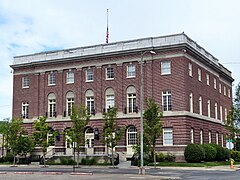Oscar Wenderoth
Oscar Wenderoth | |
|---|---|
 | |
| Born | April 10, 1871[1] Philadelphia, Pennsylvania U.S.A. |
| Died | April 14, 1938 (aged 67) New York, New York, U.S.A. |
| Nationality | American |
| Occupation | Architect |
Oscar Wenderoth (1871–1938) was an American architect[2] who served as director of the Office of the Supervising Architect from 1912 to 1915. He is identified as the architect of many government buildings built during that period, including some listed on the National Register of Historic Places.
Wenderoth was born in Philadelphia in 1871 and was the son of the noted photographer Frederick August Wenderoth, a pioneer "...in addressing the public's desire for colored photographs."[3] Early in his architectural career Oscar worked for the New York City firm of Carrere and Hastings. He first joined the Office of Supervising Architect as a senior architectural draftsman in 1897, working in the office for three separate time periods before being appointed as its director.[4]
He was appointed to the directorship by President William Howard Taft in 1912. He resigned in 1915 without providing a public explanation of his resignation.[4]
Later in his career he also worked for Weary & Alford.[5]
Selected government buildings[]

United States Post Office (now Senior Citizen's Center), Bowling Green, Ohio, 1913

United States Post Office, Blue Island, Illinois, 1914

United States Post Office, Oneonta, New York, 1915

United States Post Office, Miles City, Montana, 1916

United States Post Office and Courthouse, Pendleton, Oregon, 1916

James A. Redden Federal Courthouse, Medford, Oregon, 1916

United States Post Office, Port Jervis, New York, c.1920
U.S. Post Office, Berkeley, California, 1914
References[]
- ^ "T-SQUARE CLUB MEMBER AHEAD - Oscar Wenderoth is Appointed Senior Draftsman to the Supervising Architect of the United States". The (Philadelphia, Pennsylvania) Times: 6. March 25, 1897.
- ^ Oscar Wenderoth digital.lib
- ^ "American Portrait and Mourning Miniatures - John Henry Brown". Yale University Art Gallery. Retrieved 2015-02-08.
- ^ Jump up to: a b New York Times April 11, 1915
- ^ "The Bankers Magazine". 1919.
- 20th-century American architects
- 1871 births
- 1938 deaths
- Architects from Philadelphia
- 19th-century American architects
- United States Department of the Treasury officials
- Taft administration personnel
- American architect stubs








